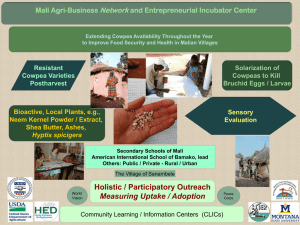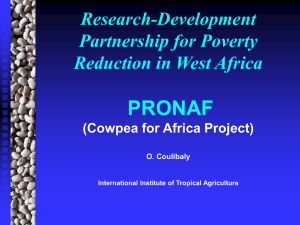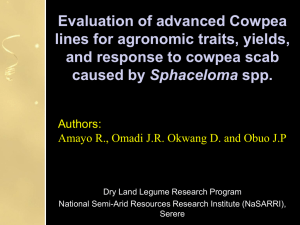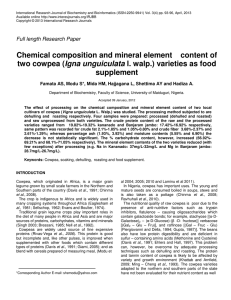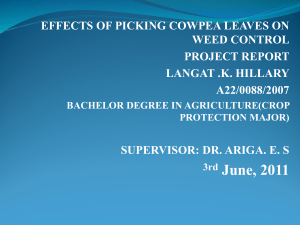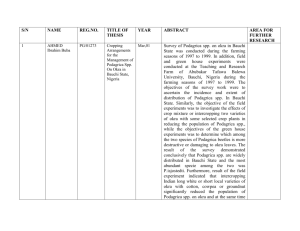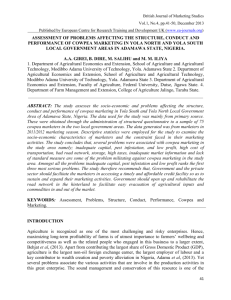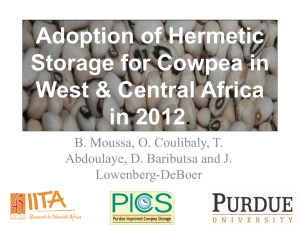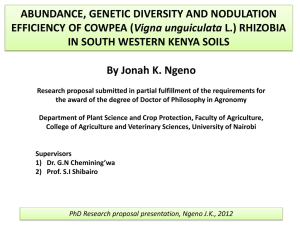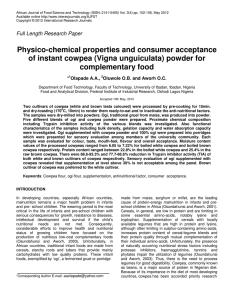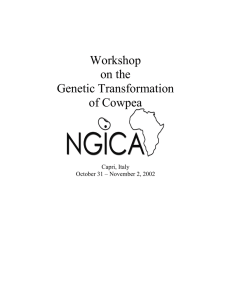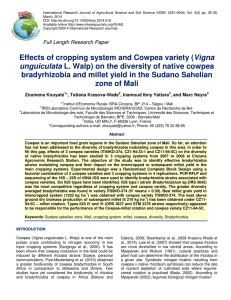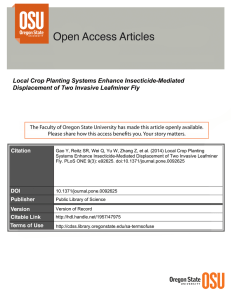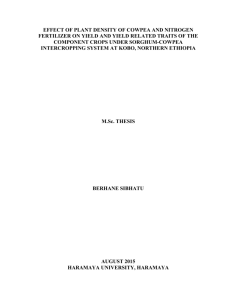Research into Use (RIU)
advertisement
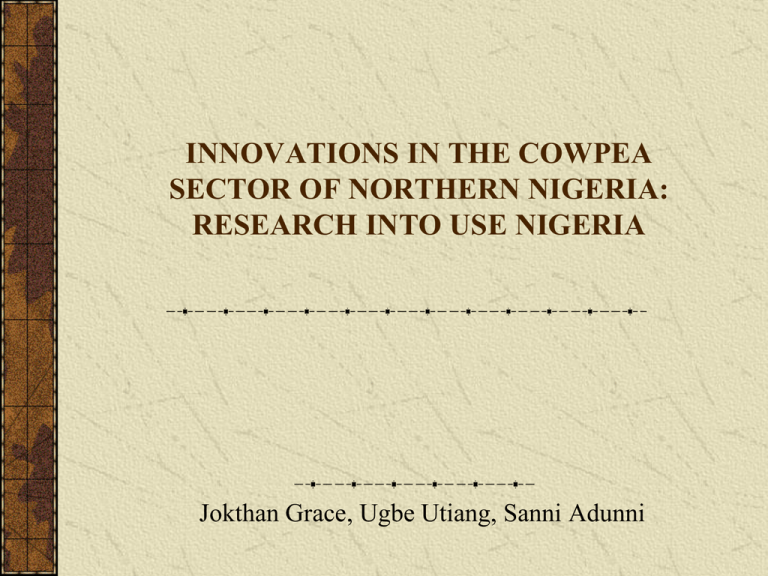
INNOVATIONS IN THE COWPEA SECTOR OF NORTHERN NIGERIA: RESEARCH INTO USE NIGERIA Jokthan Grace, Ugbe Utiang, Sanni Adunni INTRODUCTION: Research into use (RIU) A follow up of UK – DFID 200m USD investment on agriculture under RNRRS Represents a shift in emphasis from generating new technologies to ensuring that existing ‘best bet’ research outputs are promoted and out scaled Orchestrated the formation of multi-stakeholder Innovation Platform in 3 agricultural commodities Cowpea/soybeans, Cassava and Aquaculture RIU-Nigeria programme Intervenes through Field level activities in each platform Engagement with policy makers Capacity development Inter-linkages with other public sectors and development programmes that have interface or impact on target agricultural sectors Pre-implementation tasks in the cowpea sector A baseline study was conducted to: Characterize cowpea farmers in the project sites (Fig 1) Examine farmers’ awareness and adoption levels of cowpea innovations (Fig 2) Access farmer’s and traders level of involvement in cowpea production, storage and marketing (Fig 3) Identify the constraints and opportunities for increased cowpea production, storage and marketing Profile of farmers involved in cowpea production Fig 2: Farmers’ awareness and adoption levels of some cowpea innovations Fig 1: Socio-economic characteristics of farmers involved in cowpea production Improved crop residue storage 18.75 % of crop residue sold Improved processing technique 71.25 % of total harvest sold Crop rotation 1.21 Farm size for cowpea (ha) Improved storage method 9 Experience in cowpea production (yrs) Soil and water management 66 % of income from farming Application of inorganic fert. 7.77 Total farm size )ha) 16 Farming experience (yrs) Use of inorganic fertilizer 44.5 Age of respondent (yrs) Pest and disease management 6 Level of education ( years in school) 0 10 Improved cowpea variety 20 30 40 50 Averages/% 60 70 80 0 20 Adoption 40 60 Awareness 80 100 Fig 3: Farmers’ involvement in cowpea storage and marketing 100% 90% 80% 63 70% 60% 73 70 76 67 86 50% 40% 30% 20% 10% 25 26 10 7 12 Kano Kaduna 7 7 4 3 0% Immediately after harvest Katsina 1 - 3 months after harvest 25 21 Jigawa bauchi 4 - 6 months after harvest 8 Gombe PICS-RIU COLLABORATION Table 2: Roles and responsibilities of stakeholders In order to address a major challenge of cowpea storage Stakeholders IITA RIU RIU- Nigeria brokered a multistakeholders collaboration with IITA in 2009 to contribute to the dissemination of Purdue Improved Cowpea Storage (PICS) technology (Table 2) Federal Government Agency (NAFDAC, SON) Role in the collaboration Overall coordination, training, technical backstopping and evaluation in Nig. Coordination and funding activities in additional villages in some states Receive information for possible policy Formulation State level agencies – ADPs Extension services Local Government Agencies Extension services Resource persons Training of extension agents Bags’ producer and supplier Produce and sell PICS bags Community /religious leaders Broadcast PICS messages Reinforce message on health benefits Builds on PICS strategy Mass media ( TV, Radio) Farmers’ /Marketer’s associations within the IP Relay PICS message Relay PICS message Perception of farmers about hermetic cowpea storage before PICS intervention Hauwa Mohammed is a small scale bean cake (kosai) processor based in Kwalli, Gombe State. When she volunteered to provide some cowpea for demonstration using PICS bag other women laughed at her saying her cowpea will be fed to chickens after the storage period as a result of high weevil infestation. They asserted that it is not possible to store cowpea in a bag without chemical. After PICS intervention During the ‘open the bag’ ceremony six months later, they observed that the quality of the cowpea was retained after storage and that the quality was better than that of cowpea stored with chemical. Hauwa made more profit from her business that season (2010) because she bought cowpea at harvest time when price was low, stored in PICS bags and used it for her business throughout the year Economic and health benefits of hermetic storage Increase in income of farmers/traders by about 48% for cowpea stored within 4 – 6 months 5 – 10% additional increase in price for cowpea stored in triple bags Less reported cases of human fatalities Better viability of seeds especially when chemicals involving H2O are applied Fig 4: Analysis of land area allocated to cowpea, estimated production and prices 2008 - 2010 Economic potential of the technology intervention in Nigeria Dr. Oyebanji officer in charge of Nigerian Stored Product Research said “there are huge economic and business potential for large industries that manufacture hermetic technologies for cowpea storage in Nigeria” The estimated total annual production of cowpea grains in 2009 was 2.44 million MT Suppose one third of production is consumed without storing, About 16.3 million bags (1.63 Million MT/100kg = 16.3 Million bags) will be needed annually to meet market demand. SUCCESSES OF THE INTERVENTION Extension methodology Effective in creating awareness and enhancing rapid and extensive adoption of the technology among farmers Multi-agency partnership Hastened spatial coverage, increased target beneficiaries and facilitated wider adoption Quality assurance Impromptu on the spot check (thickness and sealing) of the bags produced Challenges in production and distribution of triple bags There seems to be a disconnect in information between the producer and the end users Inadequate number of vendors The cost of bag (300.00 naira) is considered too high by most farmers and grain merchants. This appears to be the major reason for poor adoption by grain merchants Low private sector drive -The company plays little role in advertising the product and relies to a large extent on IITA and the ADP to market it Way forward Identify major distributors in each senatorial district Number of pieces in a bale should be reduced The cost of the bags should be built into the selling price of the cowpea Various bag sizes should be introduced Advocate for policies to create enabling environment for private sector involvement and sustainability of the innovation Collaborate with other related public agencies such as NAFDAC, SON, and CPC to enforce laws Identify credible retail outlets and organise financial arrangement that will encourage new entry into the PICS Conclusion Agricultural innovations requires brokering role by neutral party that is trusted by all stakeholders (PICS & RIU) for effective up and out scaling Addressing policy obstacles to adoption of innovations is challenging especially where reforms run counter to powerful vested interest ( chemical use in cowpea storage) Due to public over investment in agriculture over a long period, it will take time and creativity for a neutral entity to broker meaningful, effective and sustainable roles for private sector participation even though there is a strong potential for it to happen (bag companies) THANK YOU
